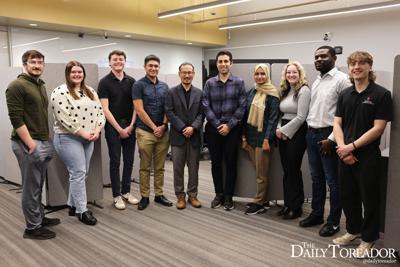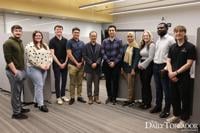A firefighting simulation study at Texas Tech analyzes aspects of pre-response tactics and achieves a personal mission for the professor conducting the study.
Department of Industrial, Manufacturing & Systems Engineering assistant professor Changwon Son and industrial engineering doctoral student Armina Rahman Mim are conducting a study to analyze participants’ responses to an emergency situation.
“I came to the U.S. to study more on safety and human cognition,” Son said. “Although I’m an engineering professor, my research tries to address locally and socially relevant problems.”
Participants are grouped into teams of three and take part in two 90-minute sessions with multiple missions. The study measures the teams’ trust and self-efficacy, but also their response time, Son said.
In the first session, the team is briefed and given time to practice the simulator with easy scenarios. In the final session, which is scheduled two days after the first, the teams do a more difficult scenario with multiple missions, according to its TechAnnounce page.
Son’s study was initially inspired by a 2013 explosion inside the fertilizer facility at West Fertilizer Company.
Twenty minutes after 911 was contacted, around 40 to 60 tons of fertilizer-grade ammonium nitrate exploded, according to the Chemical Safety and Hazard Investigation Board (CSB).
“I have a specific problem I want to solve,” Son said. “In the explosion, the incident investigation found that the major causal factor behind the fatalities was the lack of situation awareness and communication among the volunteer firefighters.”
A CSB investigation uncovered that many safety precautions were neglected and the volunteer firefighters lacked pre-incident or response training.
“Firefighters who were responding to the fertilizer warehouse, if they were informed that the warehouse had this fertilizer, ammonium nitrate, and it can explode, I think it would have influenced their situational awareness and decision-making,” Son said.
In addition to the explosion, an accident within Son’s family shifted his view on workplace treatment, inspiring him to quit his job, return to school and speak about his policies, values and the lessons he learned.
Son moved from South Korea to Texas in 2014 and earned his master’s in safety engineering and his Ph.D. in industrial engineering from Texas A&M.
He said he saw similar suffering in Lubbock as he did in some South Korea working environments, and wanted to change that.
“... my mom, my sister, my brother and I started viewing other employees as if they were my father, my mother, my sister, my brother, my siblings, and myself,” Son said. “It changed my whole life.”



(0) comments
Welcome to the discussion.
Log In
Keep it Clean. Please avoid obscene, vulgar, lewd, racist or sexually-oriented language.
PLEASE TURN OFF YOUR CAPS LOCK.
Don't Threaten. Threats of harming another person will not be tolerated.
Be Truthful. Don't knowingly lie about anyone or anything.
Be Nice. No racism, sexism or any sort of -ism that is degrading to another person.
Be Proactive. Use the 'Report' link on each comment to let us know of abusive posts.
Share with Us. We'd love to hear eyewitness accounts, the history behind an article.